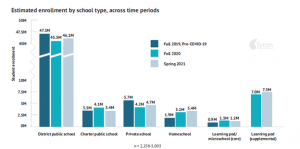A perennial issue in the Texas Legislature is school choice, or vouchers. This year a resurgence of interest has resulted from the COVID-disrupted schooling of the last two years, according to a recent article in the online newsletter The 74. Over a dozen states have created or expanded school choice programs since early 2021, according to data collected by EdChoice, a national advocacy group for school choice.
Parents have become more involved than ever before in their children’s education during the last two years, with many of them seeking alternatives to public schools. Remote virtual learning, learning pods, and home schooling outside of a traditional district have all grown exponentially. Controversies surrounding masks, vaccines, library books, and instructional materials have created divisions in many communities that have impacted parents’ satisfaction with public schools. “Since the pandemic, an estimated 17.5 percent of children have switched schools at least once, 75 percent more than in average years,” according to a July 2021 survey conducted by Tyton Partners. Public school enrollment nationally declined in fall of 2020 and while it has rebounded in spring 2021, enrollment has not met pre-COVID levels. The study also revealed that “more than 70 percent (of parents) say they will have greater expectations for the quality of education their child receives, driven by an increased emphasis on social-emotional health and individualized instruction support.”

Raise Your Hand Texas has identified School Vouchers as one of its top advocacy issues for the 2023 legislative session. The organization notes that tax credits, scholarships, savings accounts, or other voucher trends are not a solution that result in better academic outcomes for students. In a recent blog post, the organization shared polling data that showed that “over 80% (of parents) would keep their students in their neighborhood school even in other options were available,” and parent satisfaction with public schools remains high.
Challenge also creates opportunity: public school districts are re-thinking their approaches to instruction and learning acceleration. To keep families engaged, public school districts are offering parents more flexibility and choice. Advanced academic programs are an attractive option for many students—especially when programs lead to workforce readiness, industry certification, or college credit such as Cambridge International, AP, and IB. As the Tyton study noted, “Moving forward, parents report expecting their schools to create more individualized learning experiences, increase the focus on social-emotional health and integrate real-world technology applications into the daily curriculum.”
In the 2023 Texas legislative session, the debate about school choice or vouchers will likely arise again but with a new issues resulting from COVID-disrupted learning and they way in which educators and parents have adapted to this new set of circumstances.